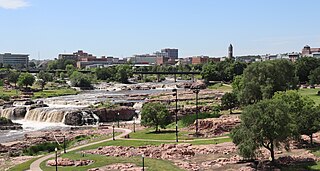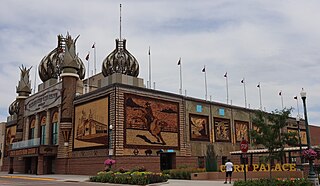Related Research Articles

South Dakota is a landlocked state in the North Central region of the United States. It is also part of the Great Plains. South Dakota is named after the Dakota Sioux tribe, which comprises a large portion of the population — with nine reservations currently in the state — and has historically dominated the territory. South Dakota is the 17th-largest by area, but the fifth-least populous, and the fifth-least densely populated of the 50 United States. Pierre is the state capital, and Sioux Falls, with a population of about 213,900, is South Dakota's most populous city. The state is bisected by the Missouri River, dividing South Dakota into two geographically and socially distinct halves, known to residents as "East River" and "West River". South Dakota is bordered by North Dakota to the north, Minnesota to the east, Iowa to the southeast, Nebraska to the south, Wyoming to the west, and Montana to the northwest.

South Dakota State University is a public land-grant research university in Brookings, South Dakota, United States. Founded in 1881, it is the state's largest university and is the second oldest continually operating university in the state, trailing the University of South Dakota which was founded in 1862. The university is governed by the South Dakota Board of Regents, which governs the state's six public universities and two special schools.

Sioux Falls is the most populous city in the U.S. state of South Dakota and the 121st-most populous city in the United States. It is the county seat of Minnehaha County and also extends into northern Lincoln County to the south, which continues up to the Iowa state line. The population was 192,517 at the 2020 census, and in 2022, its estimated population was 202,078. According to city officials, the estimated population had grown to 213,891 as of early 2024. The Sioux Falls metro area accounts for more than 30% of the state's population. Chartered in 1856 on the banks of the Big Sioux River, the city is situated in the rolling hills at the junction of interstates 29 and 90.

The Big Sioux River is a tributary of the Missouri River in eastern South Dakota and northwestern Iowa in the United States. It flows generally southwardly for 419 mi (674 km), and its watershed is 9,006 sq mi (23,330 km2). The United States Board on Geographic Names settled on "Big Sioux River" as the stream's name in 1931. The river was named after the Lakota people which was known by them as Tehankasandata, or Thick Wooded River.
Mount Marty University is a private Benedictine university in Yankton, South Dakota.

John Randolph Thune is an American politician serving as the senior United States senator from South Dakota, a seat he has held since 2005. A member of the Republican Party, he has been elected the Senate majority leader and Senate Republican leader, a post he is to assume in January 2025. Thune is in his fourth Senate term and is the Senate minority whip, a post he has held since 2021, and the dean of South Dakota's congressional delegation. From 1997 to 2003 he served three terms as the U.S. representative for South Dakota's at-large congressional district.

The Corn Palace, commonly advertised as The World's Only Corn Palace and the Mitchell Corn Palace, is a multi-purpose arena/facility located in Mitchell, South Dakota, United States. The Moorish Revival building is decorated with crop art; the murals and designs covering the building are made from corn and other grains, and a new design is constructed each year. The Corn Palace is a popular tourist destination, visited by up to 500,000 people each year.

Dacotah Field is an outdoor stadium in the north central United States, on the campus of North Dakota State University (NDSU) in Fargo, North Dakota. It is the former home of the North Dakota State Bison football team, and the current home of the North Dakota State Bison women's soccer team. The field runs east-west at an approximate elevation of 900 feet (275 m) above sea level.
The Watertown Public Opinion is published in Watertown, South Dakota, United States, serving eastern South Dakota and western Minnesota. The fourth largest newspaper in South Dakota publishes in the afternoon, Tuesday through Friday.

4-HO-MET is a lesser-known psychedelic drug. It is a structural and functional analog of psilocin as well as the 4-hydroxyl analog of methylethyltryptamine (MET). 4-HO-MET was first synthesized by Alexander Shulgin. In his book TiHKAL, the dosage is listed as 10-20 mg. 4-HO-MET produces psilocin-like distortion of color, sound, and form. Very little data exists about the pharmacological properties, metabolism, and toxicity of 4-HO-MET. There have been no reports of deaths from 4-HO-MET, even though there exist anecdotal reports of the ingestion of up to 150 mg, more than an order of magnitude above the effective dose.

South Dakota is the 46th-most populous U.S. state; in 2019, the U.S. Census Bureau estimated a population of about 884,659. The majority of South Dakotans are White, and the largest religion is Christianity. In 2010, 93.46% of the population spoke English as their primary language.
The culture of the U.S. state of South Dakota exhibits influences from many different sources. American Indians, the cultures of the American West and Midwest, and the customs and traditions of many of the state's various immigrant groups have all contributed to South Dakota art, music, and literature.

Solar power in South Dakota has high potential but little practical application. The state ranked 50th among U.S. states in installed solar polar in 2015 with no utility-scale or large commercial systems. Photovoltaic panels on rooftops can provide 38.7% of all electricity used in South Dakota using 3,800 MW of solar panels. The state is ranked 14th in the country in solar power potential, and 4th in wind potential.

The state of South Dakota is a leader in the U.S. in wind power generation with over 30% of the state's electricity generation coming from wind in 2017. In 2016, South Dakota had 583 turbines with a total capacity of 977 megawatts (MW) of wind generation capacity. In 2019, the capacity increased to 1525 MW.
Dean Albert Wink is an American politician and former football player who played parts of three seasons in the National Football League (NFL) with the Philadelphia Eagles from 1966 to 1968. A Republican, he represented District 29 in the South Dakota House of Representatives from 2009 to 2016. Wink was the Speaker pro tempore of the House from January 11, 2011 to January 10, 2015 and the Speaker of the House from January 10, 2015 to January 10, 2017.

The 2016 United States presidential election in South Dakota was held on November 8, 2016, as part of the 2016 United States presidential election in which all 50 states plus the District of Columbia participated. South Dakota voters chose electors to represent them in the Electoral College via a popular vote pitting the Republican nominee, celebrity Donald Trump, and running mate Indiana Governor Mike Pence against Democratic nominee, former Secretary of State Hillary Clinton and her running mate, Virginia Senator Tim Kaine.

The South Dakota Library Association (SDLA) is a professional organization for South Dakota's librarians and library workers to "promote libraries within the state and provide library service for the populace."
The COVID-19 pandemic in South Dakota is an ongoing viral pandemic of coronavirus disease 2019 (COVID-19), a novel infectious disease caused by severe acute respiratory syndrome coronavirus 2 (SARS-CoV-2). The state of South Dakota reported its first four cases and one death from COVID-19 on March 10, 2020. On June 15, 2021, South Dakota public health authorities reported 25 new cases of COVID-19, bringing the state's cumulative total to 124,377 cases. The state's COVID-19 death toll is 2,026, with no new deaths reported over the previous 24 hours. The state ranks 9th in deaths per capita among U.S. states, and 3rd in cases per-capita, behind only North Dakota and Rhode Island.

The 2024 United States presidential election in South Dakota took place on Tuesday, November 5, 2024, as part of the 2024 United States presidential election in which all 50 states plus the District of Columbia will participate. South Dakota voters will choose electors to represent them in the Electoral College via a popular vote. The state of South Dakota has three electoral votes in the Electoral College, following reapportionment due to the 2020 United States census in which the state neither gained nor lost a seat.
References
- ↑ "2763". sdlegislature.gov. Retrieved 2016-09-29.
- ↑ South Dakota. Legislature (1993). Legislative Manual, South Dakota. Secretary of State. Retrieved 2016-09-29.